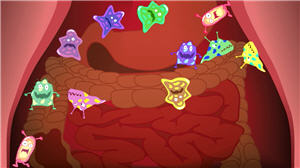
On my what?! I didn’t even know I had any gut microbes, you might be thinking.
“That’s an understandable reaction to an aspect of human health that doesn’t normally get a lot of attention,” said Michael Puff, MD, a gastroenterologist with Spectrum Health Medical Group. “But the wrong mix of gut microbes can help predispose a person to a number of serious health conditions, and antibiotics can be a very disruptive factor in depleting beneficial microbes.”
Microbes help to digest plant and other organic material in the human gastrointestinal system, where they outnumber human cells 10-to-1. They play key roles in digestion, food absorption and glucose metabolism.
Disruption of these crucial metabolic processes can lead to weight gain, obesity and type 2 diabetes, Dr. Puff said.
Scientists now suspect that antibiotic use–especially overuse–can have negative effects on these processes and other health issues, including stress and behavior.
It has been widely shown that antibiotics can have unwanted side effects on beneficial gut microbes. But a new study by researchers at Oregon State University, published in the journal Gut, helps explain in detail why that is happening, and also suggests that long-term antibiotic use can have far-reaching effects on human health.
Using a mouse model of the gut microbe population, researchers experimented with a cocktail of commonly prescribed antibiotics, discovering that most antibiotic-induced changes in the gut can be explained by three factors: depletion of the microbiota, direct effects of antibiotics on host tissues, and the impact of surviving antibiotic-resistant microbes.
Microbiota depletion had the most significant impact on different aspects of immunity. However, the two other factors had profound effects on mitochondria found in cells in the gut. Mitochondria are structures often referred to as the cell’s powerhouse. They supply cellular energy and are involved in tasks such as signaling, cellular differentiation and cell death, as well as maintaining control of the cell cycle and cell growth.
The effects of the antibiotic cocktail on host tissues and antibiotic-resistant microbes often inhibited mitochondrial gene expression as well as affecting the amounts of active mitochondria in cells.
The impact on mitochondria, in turn, led to an increase in the death of epithelial cells that line the surface and cavities of the intestine. Researchers said this is important because the epithelium is the site of nutrient absorption and plays a key role in the human immune system.
Antibiotics are an important and integral part of treating a host of bacterial and other infections. In the U.S. each year, 40 percent of adults and 70 percent of children take at least one antibiotic.
Are there alternatives?
“Antibiotics play a critical and irreplaceable role in treating a wide variety of infectious diseases,” Dr. Puff said. “That being said, there are many who feel that they are overprescribed and overused.”
Researchers say their study has established a comprehensive resource on the effects of antibiotics.
“The findings of this study may prove to be an important resource in disease management as we continue to search for ways to ensure the long-term health and safety of patients being treated with antibiotics,” Dr. Puff said.
 /a>
/a>
 /a>
/a>
 /a>
/a>